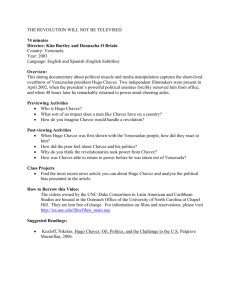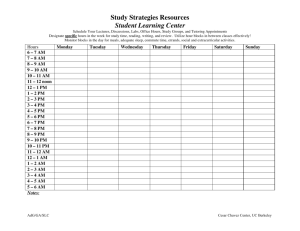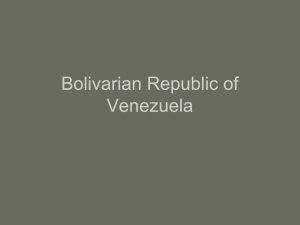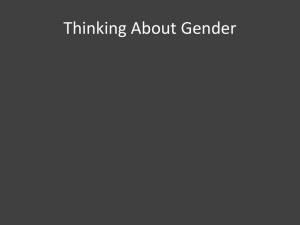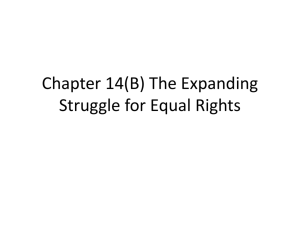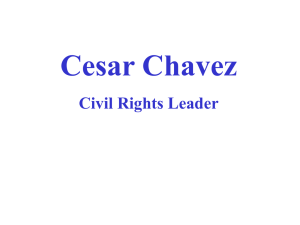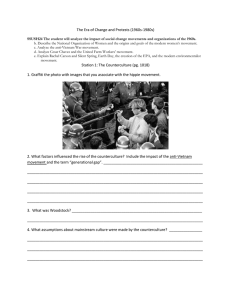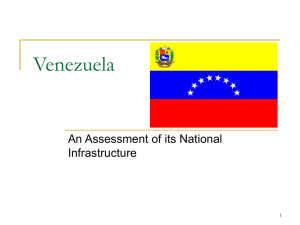Testimony before the Senate Foreign Relations Subcommittee on Western Hemisphere, Peace
advertisement
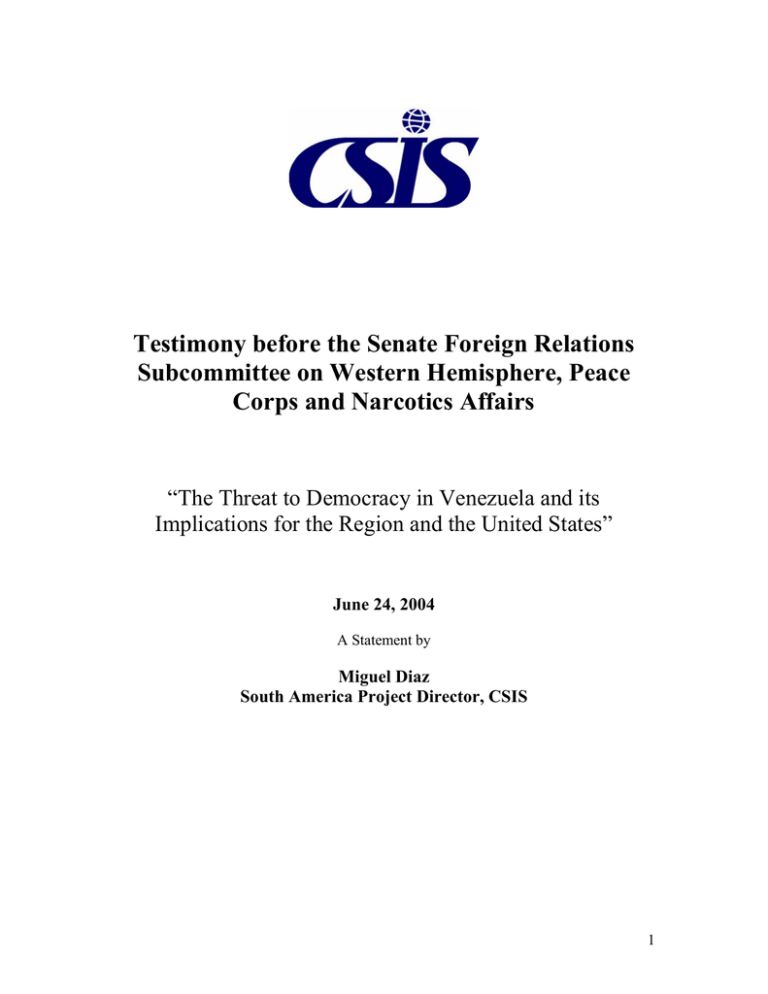
Testimony before the Senate Foreign Relations Subcommittee on Western Hemisphere, Peace Corps and Narcotics Affairs “The Threat to Democracy in Venezuela and its Implications for the Region and the United States” June 24, 2004 A Statement by Miguel Diaz South America Project Director, CSIS 1 Chairman Coleman and ranking member Senator Dodd, I commend you for calling this timely hearing on a subject of such importance, namely, the state of democracy in Venezuela and the threat posed by the government of Hugo Chavez to Venezuela, to its neighbors, and to the United States. I am grateful for the opportunity to contribute to these deliberations. Let me underscore that my comments represent my views only and not those of the Center for Strategic International Studies, the organization I work for as Director of the South America Project. In my view, Venezuela’s democracy – never in great shape to begin with – finds itself now in intensive care. That is because over the past five-plus years that Hugo Chavez has been in power, the government has weakened the foundations of Venezuela’s democracy by systematically hacking away at the institutional checks on Chavez’s authority. Next on the block is the judiciary, which he is about to hijack by stacking the Supreme Court with 12 additional pro-Chavez judges. The non-governmental institutional checks on governmental authority have also come under fire, in many cases literally. The latter include the labor unions, the press, and even the church. It is also a government that has never seriously pursued a democratic discourse with the opposition, irresponsibly painting with one brush stroke most of those who oppose it as traitors and even worse. In recent months, the Chavez government has crossed over the line by selectively arresting opposition leaders, torturing some members of the opposition (according to human rights organizations) and encouraging, if not directing, its squads of Bolivarian Circles to beat up members of Congress and intimidate voters – all with impunity. This is a president who comes from the same mould as the likes of Zimbabwe’s Robert Mugabe, whom Chavez described as a “warrior for freedom” at a recent conference of developing world leaders in Caracas. In sum, Chavez is an anachronism, a return to a dark past that many thought Latin America had overcome. Let us not forget that Chavez initially entered the political scene as the leader of a military coup against a democratically elected government. It is a government that lies shamelessly, with the lies getting more and more preposterous by the day, including lies about the United States and our role in Venezuela. Misery and unprecedented strife is what he has brought to Venezuela. However, I do recognize that Chavez is the byproduct of Venezuela’s dysfunctional democratic history and that he has succeeded in giving hope to many who have been marginalized politically and economically in the past. Nonetheless, in practice he has done little to improve their lots. In fact, the rate of poverty growth has accelerated over the five years he has been in power. According to the U.S. Treasury Department, extreme poverty has risen from 21% in 1998 to 33% in 2002. In the same period, per capita income has dropped from US$3,800 in 1998 to US$2,800 in 2003. Chavez may even be sincere about addressing the many injustices present within the country, but to me, what makes Hugo Chavez a tragic figure is that he had the unique opportunity, upon his election, of building a consensus to enable Venezuela to start fresh. But he squandered this opportunity, instead, choosing the politics of resentment and deceit that goes by the name of the Bolivarian Revolution. We have seen this story before. History has taught us 2 that not all who come to power through elections are democrats. How to deal with the wolves that hide in the sheep’s clothing of democracy, I am afraid, is a question that as a matter of policy we, as a country, have not been able to adequately answer. The good news is that Venezuelans have before them the opportunity to resolve the question of Chavez in a constitutional, democratic, and peaceful manner. I believe the majority of Venezuelans, on both sides of the political divide, want such a resolution. By the millions, Chavez’s foes have doggedly latched onto the electoral option in pursuit of a referendum on the president’s tenure, and despite the many legal, quasi-legal, and outright reprehensible obstacles put in their way by the government and its supporters, they have finally reached this goal. The referendum has been scheduled for August 15. Based on the polls I have seen, it seems they have a good chance to revoke his mandate, assuming they are faithfully tallied. Moreover, it is a real credit to the opposition that, by-and-large, it has purged from its ranks those few who would have preferred to resolve this crisis using unconstitutional means. In getting to this point, credit also should be given to the OAS and the Carter Center for their hard work and persistence in sticking to their commitment to monitor the referendum petition process. Without their contribution, I am afraid the Chavez government would have truncated the process or stolen it outright. It is also a relief to see that Chavez’s message of resentment, class warfare, and crass populism has not resonated with the vast majority of Latin Americans who still put their trust in the democratic process. Chavez’s Bolivarian model is not seen as worthy of imitation by Latin America’s mainstream political right or political left. Chavez himself is generally held in low esteem, regarded as boorish, and at best incompetent. However, I would not be so dismissive of him. I believe that he poses a grave threat -- now more than ever -- and the community of democracies should take him more seriously than it has up to now. There are a number of reasons why I believe this to be the case. Although Chavez’s message of resentment does not appeal to Latin America’s democratic majority, his message does resonate with many of the Latin Americans who are losing faith in democracy’s ability to deliver a better quality of life. According to the poll, the percentage of those who are often called “anti-systemic” has been rising in step with the contraction of opportunities for economic advancement and the deterioration of democratic governance. The percentage of the disaffected varies from country to country, with their numbers in the Andean countries being dangerously high. That explains why, for example, Chavez has a substantial following in Bolivia and has practically none in Chile, the latter a country that has been successful at building consensus and delivering progress and a real reduction in poverty. What makes Chavez frightfully dangerous is that thanks to oil he has the financial wherewithal to support many of the anti-systemic forces that are festering throughout the region. Currently, the government has approximately US$24 billion in foreign exchange reserves available. Chavez has been sponsoring forces of questionable democratic 3 credentials in Bolivia and Ecuador – all countries that are faltering in their commitment to democracy, where the balance could be tipped by this kind of intervention. Chavez is the primary financial support for Castro’s government to the tune of about 78,000 barrels of oil a day, undercutting the Bush administration’s attempt to isolate, and ultimately, dislodge that evil regime. Chavez, in turn, is getting an army of teachers, doctors, and sports trainers, many of whom are feared to be collaborating with the state’s increasing repression. It should be noted that the U.S. has inadvertently bankrolled much of these activities by buying 54% of Venezuela’s oil exports. There is also a significant amount of anecdotal evidence that suggests that the Venezuelan government has been, at least, tolerant of the FARC and the ELN by allowing the country to be used by these groups as a safe haven. I think it is fair to say that Venezuela has not been as cooperative as Colombia’s other neighbors in helping to corral these terrorist groups. With regards to the United States, Chavez has thus far been more of a nuisance, and less of a real and imminent threat. For a while now, Chavez has been looking to provoke Washington by engaging in name-calling and blaming us for his troubles, and the Bush Administration’s Latin American team deserves kudos for not taking his bait. By and large, his charges have fallen on deaf ears, as he is internationally discredited. On the more serious charge that he is hosting Middle East-linked terrorist organizations, I have yet to see any solid evidence to that effect. The U.S. intelligence services hopefully have a better idea than I do of whether these allegations are correct. Just because there is a substantial Arab population in Venezuela – much like in other South American countries -- does not validate our worst fears. On a broader diplomatic level, Chavez may be dismissive of some of the regional initiatives that we have championed, like FTAA, but he is not alone. However, the alternatives he has put on the table have no gotten any traction whatsoever in the region either. His uncooperative stance in the international arena, like the visit to Saddam Hussein that broke the international isolation of that brutal regime, was unhelpful, and may have been meant to prick at the U.S., but was in keeping with the sovereign right of the country to manage its foreign relations as it sees fit. Now this could all change if Chavez decides to disrupt the legitimacy of the referendum. Disturbingly, there are indications that this is exactly what he has up his sleeve. If Chavez does not allow for an on time, fair and transparent execution of the referendum, the consequences for the U.S. could be serious. For starters, there is the risk that it could trigger an outburst of violence (some even fear a civil war) that could potentially drag the U.S. in. The humanitarian and economic repercussions that such an eventuality could occasion in terms of refugees flocking to our shores and disruptions of U.S. business interests are substantial. Moreover, if Chavez is able to get away with cheating his way into staying in power, it may encourage others in the region to follow in his footsteps, negating the hard won efforts to keep the region’s democracies (albeit with small d) afloat. Moving forward, let me close by offering some thoughts on what the U.S. government, 4 and the U.S. Congress in particular, could do to avert such an eventuality. As I see it, the basic question that the U.S. Congress has to answer is whether it is prepared to make an investment now to ensure that the upcoming referendum process is transparent and credible to both sides. If the U.S. government is not prepared to make this investment, it risks having to contend with the previously described consequences of what could result without such engagement. Venezuelans have shown themselves perseverant in safeguarding their democratic rights at the cost of many lives over the past few years. I hope the international community is equally committed to the defense of those hard-won democratic rights that many in this country take for granted. Although ultimately, the wellbeing of Venezuela’s democracy rests with Venezuelans themselves, the international community can make an important contribution. I would argue that the level of international engagement in Venezuela must be ratcheted up substantially, and this must begin now, as the National Electoral Council is already taking steps that put in doubt its capacity and commitment to do a fair accounting of the votes. Its decision, for example, to use an untested electronic voting system of a Boca Ratonbased company (Smartmatic) partly owned by the Venezuelan government is of concern. I am also troubled by the government’s efforts to circumscribe the role of the OAS and the Carter Center, reports of government raids on independent media outlets, and the accelerated naturalization of non-nationals on the basis of suspect criteria in order to give them voting rights. It is also important to put the electoral authorities on notice that the eyes of the world are upon them and that they will be accountable to the international community for any attempt to alter the vote, no matter for which side. The right to vote is a human right, and those who violate that sacrosanct privilege are human rights violators. The moral burden to live up to the high calling of assuring a free and fair vote should be even greater, considering the likelihood that any perception of wrongdoing will result in bloodshed. What is important is not that elections take place, but assuring that the environment in which they take place is unfettered. After all, Cuba has elections too, but we know they don’t make Cuba a democracy. In engaging itself in this issue, the modus operandi of the U.S. at all times should be to work in tandem with the international community. It can do so through the Group of Friends, through the OAS, and other multilateral mechanisms available. For starters, I believe Congress should support the administration in a bipartisan fashion in its efforts to assure adequate international monitoring of the referendum. It is also important that Washington speaks with one voice on the matter, otherwise the Venezuelan government will be apt to exploit perceived divisions. If the U.S. Congress chooses to directly engage itself as an observer, it should do so in concert with other countries. I also believe it is important to try to continue to take the high road and not succumb to Chavez’s bait to try bilateralize the problem. Lastly and most importantly, the U.S. has to do more, much more, to assure that the circumstances that led to the rise to power of someone like Hugo Chavez are addressed, not just in Venezuela, but throughout the region. The problem is bigger than Hugo 5 Chavez. Throughout Latin America, not enough jobs are being created to put food on the table for too many families, personal insecurity is rampant, and the political machinery in many countries is dysfunctional and rife with corruption. I cannot blame the many who see Chavez as a savior; they are desperate and deserve better than the snake oil that Chavez has provided them. Washington must be more a part of the solution to the troubles that afflict the region. Democratic institutions needed to be fortified, and in some case rebuilt entirely, new options for economic growth need to be explored, and more attention has to be given to the staggering income inequality that plagues the entire region. It won’t be cheap and it may entail crossing some interests within our own borders, but in the long term it will be in the best interest of both the U.S. and Latin America. Thank you for your attention and I look forward to answering any questions you may have. 6
